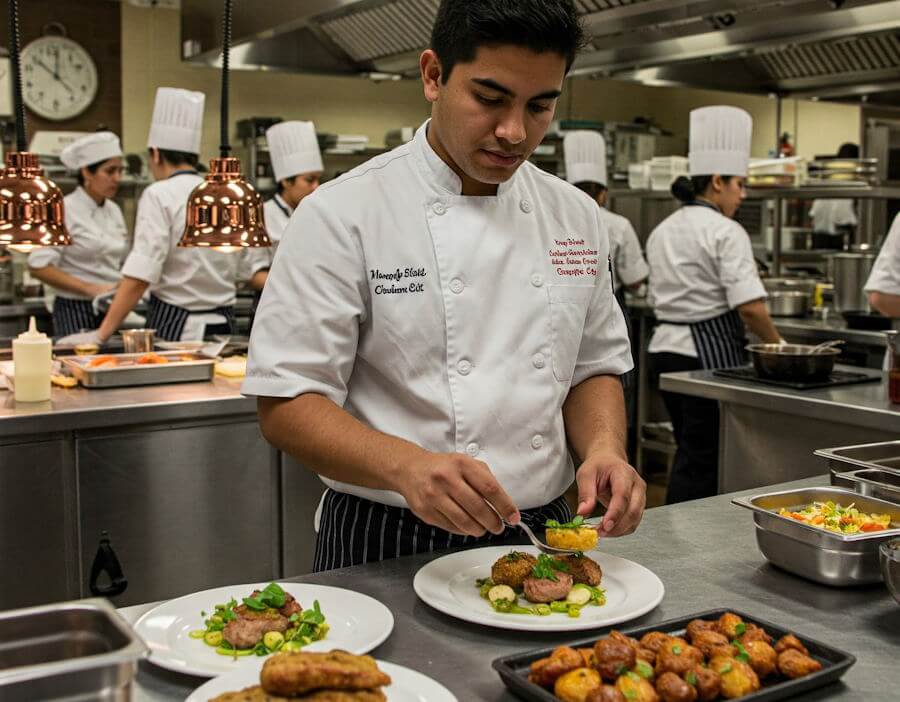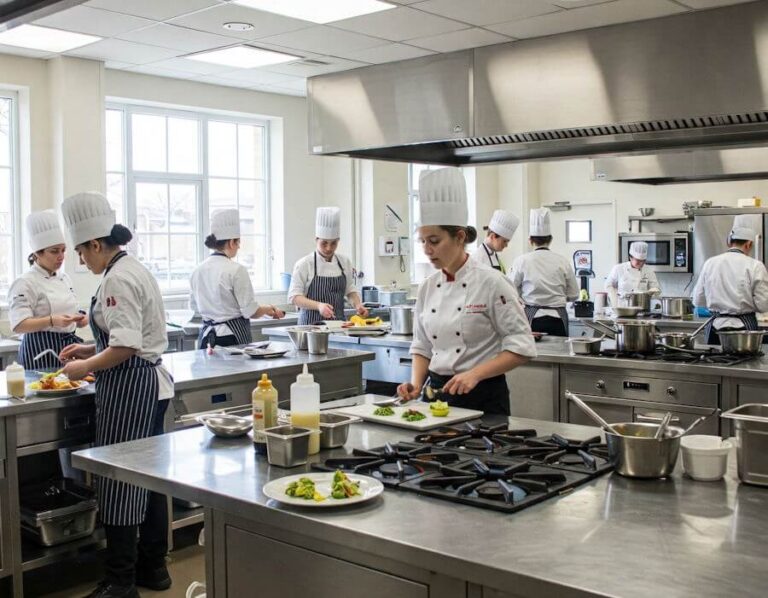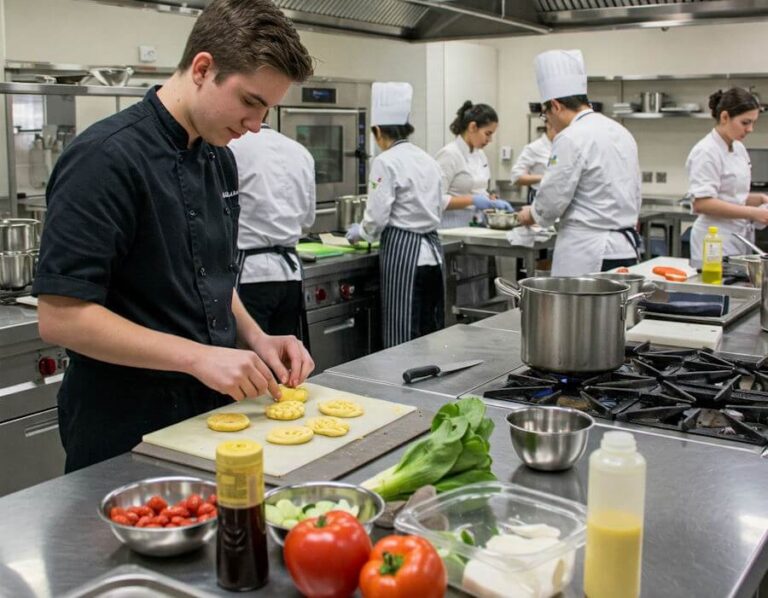Culinary training serves as the cornerstone for aspiring chefs seeking to establish a successful career in the restaurant industry. It encompasses a variety of learning experiences designed to impart essential skills and knowledge required for cooking, baking, food safety, and kitchen management. Through structured culinary education, individuals are equipped with foundational skills that enable them to efficiently execute recipes, manage kitchen operations, and understand food production techniques. The art of cooking, while inherently creative, also demands a solid understanding of the principles and techniques that dictate successful culinary practices.
The significance of culinary training cannot be overstated; it not only enhances an individual’s culinary skills but also fosters creativity and professionalism—two critical components in a highly competitive environment. This training encourages aspiring chefs to explore innovative techniques, experiment with flavors, and embrace diverse cuisines, ultimately broadening their culinary repertoire. As chefs develop their unique style and philosophy, they are more likely to stand out in the ever-evolving landscape of the restaurant industry.
Culinary education comes in numerous forms, each catering to different learning preferences and career goals. Formal education at culinary schools or colleges provides in-depth training in various aspects of the culinary arts, often culminating in a degree or diploma. Alternatively, apprenticeships offer hands-on experience within professional kitchens, allowing aspiring chefs to learn directly from seasoned professionals. In recent years, online resources and courses have gained popularity, providing flexible learning options for those unable to commit to traditional classroom settings. Overall, the pursuit of culinary training is a vital step in unlocking a fruitful restaurant career, paving the way for personal growth and professional success.
Essential Skills Acquired Through Training
Culinary training is pivotal in equipping aspiring chefs with a comprehensive skill set that lays the foundation for a successful career in the restaurant industry. Among the fundamental skills gained during culinary education, knife skills are paramount. Mastering the art of using various knives for different types of food preparation not only enhances efficiency but also fosters safety and precision in the kitchen. Proper knife techniques can prevent accidents and ensure that ingredients are cut uniformly, which is essential for consistent cooking results.
Another crucial aspect of culinary training is the emphasis on food safety and hygiene practices. Understanding the principles of food handling, storage, and sanitation is vital for every culinary professional. This knowledge helps mitigate the risk of foodborne illnesses and ensures compliance with health regulations. Aspiring chefs learn about the importance of maintaining a clean workspace, the proper internal cooking temperatures for various proteins, and the practices necessary to prevent cross-contamination, all of which are instrumental for a successful career in the restaurant sector.
Moreover, culinary training introduces students to a variety of cooking techniques and methods, such as sautéing, roasting, grilling, and baking. Gaining proficiency in these techniques not only enhances a chef’s repertoire but also provides the flexibility to adapt recipes and innovate new dishes. Additionally, studying global cuisines allows culinary professionals to appreciate diverse culinary traditions, flavor profiles, and cooking styles. This knowledge broadens their culinary perspective and empowers them to create unique dishes that appeal to an increasingly global clientele.
Ultimately, the essential skills acquired through culinary training, including knife skills, food safety, and a deep understanding of cooking techniques, play a significant role in enhancing a chef’s versatility. This versatility is crucial for adapting to various kitchen environments and meeting the dynamic demands of the restaurant industry.
Professional Networking Opportunities
Culinary training serves as a vital platform for individuals looking to forge meaningful connections within the food industry. Attending culinary schools or specialized training programs enables aspiring chefs and restaurant professionals to interact with instructors who are often seasoned industry veterans. These instructors not only impart their expertise but also provide valuable insights into the dynamics of the restaurant business, opening doors to potential job placements. The relationships formed during this training period can become pivotal in establishing a successful career.
Moreover, culinary training programs typically comprise diverse cohorts of students, each bringing unique backgrounds and aspirations. Collaborating on projects, participating in kitchen competitions, or simply sharing experiences during class discussions allows students to build connections that may extend well beyond their time in the program. Such relationships often lead to friendships and alliances that can support career advancements. Networking with peers can yield opportunities for future collaborations, creating an ecosystem of mutual benefit that is crucial in the competitive food industry.
In addition to interactions with instructors and classmates, culinary training often includes guest lectures and workshops from established chefs and industry professionals. These events provide a unique opportunity for aspiring culinarians to engage with leaders in the culinary field. Networking at these events may lead to internships, jobs, or mentorship opportunities that can significantly enhance career prospects. Mentors acquired through culinary training can offer guidance, share industry contacts, and advocate for aspiring chefs, further facilitating their entrance into the restaurant scene.
Overall, the networking opportunities provided by culinary training are an indispensable component of career development in the food industry. The connections made during this time can yield fruitful results that propel individuals into successful restaurant careers, marked by growth and diverse opportunities.
Gaining Experience in Real-World Kitchens
One of the most significant advantages of culinary training programs is the opportunity to gain hands-on experience in real-world kitchens. Internships and externships serve as invaluable components of these programs, allowing aspiring chefs to immerse themselves in the hustle and bustle of culinary environments. Such experiences are essential for building foundational skills and understanding the intricacies of kitchen operations, which cannot be fully appreciated in a classroom setting.
Through internships, students work alongside seasoned professionals, enabling them to apply the theoretical knowledge acquired during their training to practical situations. This exposure is not only crucial for developing specific cooking techniques but also for honing other essential skills. Time management, for instance, becomes a vital focus as chefs must learn to juggle multiple tasks simultaneously, from preparing ingredients to plating dishes under pressure. Such competence is crucial in the fast-paced world of restaurants, where efficiency can significantly impact customer satisfaction and operational success.
Understanding kitchen dynamics is another important aspect gained through real-world experience. Culinary training programs often emphasize the importance of teamwork, communication, and hierarchy within kitchen staff. By participating in a bustling kitchen, students observe how chefs collaborate, resolve conflicts, and maintain a productive work environment. These interpersonal skills are essential, as the restaurant business often requires a smooth synergy between various roles to achieve common goals.
Furthermore, real-world kitchen experiences allow aspiring chefs to gain a deeper appreciation for ingredient sourcing, menu planning, and the importance of presentation. Each of these factors contributes to creating an exceptional dining experience, which can differentiate a restaurant in a competitive market. Ultimately, the hands-on experience gained through culinary training programs equips future chefs with the skills and insights required to thrive in their restaurant careers.
Building Confidence and Creativity
Culinary training plays a significant role in fostering both confidence and creativity among aspiring chefs. By providing a structured learning environment, culinary schools and programs enable students to master essential cooking techniques and understand various cuisines. This foundation allows budding chefs to experiment and innovate in the kitchen confidently.
Learning from industry professionals is a critical aspect of culinary education. Experienced chefs often serve as mentors, sharing invaluable insights and practical skills gained over years in the culinary world. This mentorship not only imparts knowledge but also instills a sense of assurance in students as they begin to hone their culinary abilities. Through hands-on training, students get first-hand experience of kitchen dynamics, enhancing their skills while simultaneously building their self-esteem. The practice of executing time-sensitive tasks and managing kitchen operations teaches aspiring chefs how to navigate potential challenges they may face in a professional setting.
Engaging in competitions and practical projects is another essential element of culinary training. Such activities provide students with an outlet to express their creativity, allowing them to experiment with ingredients, presentation styles, and flavors. The thrill of competition encourages culinary students to push boundaries and discover unique interpretations of traditional dishes. Additionally, these experiences promote networking opportunities with industry peers, further inspiring creativity as they share ideas, techniques, and feedback.
Ultimately, culinary training provides a supportive environment for aspiring chefs, nurturing their confidence and encouraging creative expression. As they navigate the culinary landscape, these skills become indispensable not only for personal development but also in crafting a distinctive culinary style that sets them apart in a competitive restaurant career.
Staying Updated with Industry Trends
Culinary training plays a crucial role in equipping aspiring chefs with the knowledge and skills necessary to stay current with the dynamic nature of the restaurant industry. As the culinary landscape continually evolves, it is imperative for chefs to remain informed about the latest advancements, including innovative cooking techniques, technological integration in food preparation, and shifts in consumer preferences. Engaging in ongoing culinary education allows chefs to adapt their skills and techniques according to these trends, thereby enhancing their career prospects in a highly competitive field.
One significant aspect of modern culinary training includes mastering the use of advanced kitchen technology. As restaurants increasingly integrate tools such as sous-vide machines, induction cookers, and other sophisticated equipment, chefs who undergo formal training are better positioned to utilize these technologies effectively. This practical knowledge not only increases the efficiency of food preparation but also enhances the overall dining experience through improved food quality.
Furthermore, with the growing emphasis on sustainable cooking practices, culinary training programs now focus on teaching aspiring chefs the importance of sourcing local ingredients, understanding seasonal produce, and implementing waste-reduction strategies. By embracing sustainability, chefs can meet the rising consumer demand for environmentally friendly dining options, thereby contributing positively to their restaurant’s reputation and profitability.
Additionally, customer preferences are continually shifting, influenced by trends such as plant-based diets and health-conscious eating. A comprehensive culinary education allows chefs to explore and incorporate these evolving interests into their menus, ensuring they appeal to a broad range of clientele. Thus, continuous professional development in culinary arts not only supports chefs in honing their culinary skills but also prepares them to respond to industry changes with vigor and creativity.
Career Advancement Opportunities
Culinary training is a pivotal factor in advancing one’s career within the restaurant industry. The structured education offered through culinary programs not only sharpens cooking skills but also provides the foundational knowledge required to navigate various career paths. For instance, aspiring chefs who undergo formal training are often positioned to ascend to roles such as head chef or sous chef, where they can lead kitchen teams, develop menus, and uphold food quality standards.
In addition to culinary skills, these programs frequently include coursework on restaurant management, which is essential for those looking to transition into managerial roles. Graduates with a comprehensive background in culinary arts and business management are prime candidates for positions such as restaurant manager. Here, they can utilize their culinary knowledge to enhance operations, optimize staffing, and improve customer service, ultimately elevating the dining experience.
The versatility of culinary training also opens pathways to less conventional yet lucrative roles, such as food consultants or culinary instructors. Food consultants leverage their expertise to advise restaurants on menu development, cost management, and supply chain logistics, providing valuable insights that can lead to increased profitability. Similarly, trained chefs who enjoy sharing their knowledge can explore opportunities in education, mentoring the next generation of culinary professionals.
Moreover, obtaining specialized certifications—such as those in pastry arts, nutrition, or food safety—can further enhance a chef’s qualifications, making them more competitive in the job market. Such credentials not only demonstrate a commitment to professional growth but also equip chefs with unique skills that can be pivotal in securing promotions. Overall, culinary training serves as a cornerstone for climbing the ranks within the restaurant industry, enriching not only individual careers but also enhancing the culinary landscape as a whole.
The Financial Benefits of Culinary Training
Culinary training plays a pivotal role in enhancing the financial prospects of individuals pursuing a career in the restaurant industry. It is well-established that chefs and culinary professionals who have undergone formal education tend to command higher salaries compared to their non-trained counterparts. This salary increase can be attributed to several factors, including advanced skills, refined techniques, and a deeper understanding of kitchen operations that trained chefs possess. Employers often recognize the value of these trained individuals and are willing to offer competitive salaries to attract and retain them.
Moreover, culinary training often equips candidates with essential business acumen and management skills, which are critical in today’s dynamic food industry. This knowledge allows culinary professionals to take on leadership roles within restaurants, further increasing their earning potential. For instance, chefs with training may advance to positions such as sous chef or head chef, roles that not only bring higher salaries but also entail greater responsibility and oversight. Additionally, these trained professionals are often seen as more competent in running cohesive kitchen teams, making them integral to a restaurant’s success.
Job security is another significant financial benefit of culinary training. In a competitive job market, culinary-trained chefs tend to have an edge, as they are sought after by various establishments, from high-end restaurants to fast-casual dining. The comprehensive education received during culinary training prepares candidates for various roles, allowing them to pivot quickly in times of economic uncertainty. Consequently, they are less likely to face prolonged periods of unemployment, further solidifying the financial advantages associated with culinary training.
Conclusion: The Value of Culinary Education
In today’s competitive restaurant industry, culinary education plays a vital role in shaping successful careers. Throughout this blog post, we have explored various aspects of culinary training and its profound impact on professional growth. A solid culinary education not only equips aspiring chefs with technical skills, but also instills a deep understanding of kitchen operations, food safety, and innovative cooking techniques that are crucial for thriving in this fast-paced environment.
Culinary training provides a strong foundation in both classic and contemporary culinary practices. This education fosters creativity and allows individuals to experiment with flavors, presentation, and unique culinary styles. Furthermore, with the guidance of experienced instructors, students can refine their skills and gain valuable industry insights that are not easily acquired through self-teaching. The networks formed during training are equally significant, opening doors to opportunities and fostering relationships with other professionals in the food industry.
Investing in culinary education is essential for anyone serious about advancing their restaurant career. It enables individuals to stand out in a crowded job market and often leads to better job prospects, increased earning potential, and the chance to work in prestigious establishments. Moreover, such education encourages lifelong learning, allowing chefs to stay updated on industry trends and consumer preferences, essential factors in maintaining relevance in a rapidly evolving culinary landscape.
Ultimately, for those passionate about food and hospitality, pursuing culinary training is a meaningful step toward achieving success in the restaurant field. Embracing this educational journey not only enhances personal skills but also significantly impacts overall career trajectories, paving the way for both personal satisfaction and professional advancement in the culinary arts.




